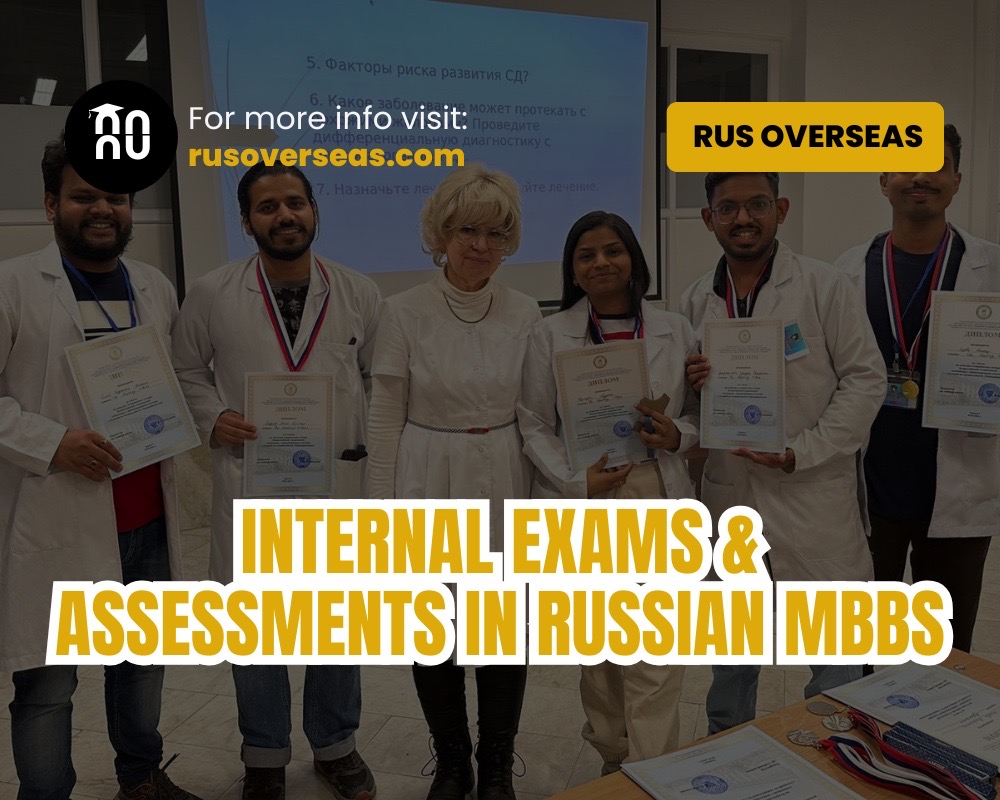Internal Exams & Assessments in Russian MBBS.

Okay, so you're starting your MBBS in Russia? Good for you, but let's talk about something that might seem a little intimidating at first: internal exams. They're necessary, but they're not some invincible monster. Consider them more like training wheels – they're there to help you develop your skills and confidence for the big final exams.
The thing is, Russian medical schools don't just toss a final exam at you and cross their fingers. They have this entire system of internal exams, and they're dead serious business. Why? Several reasons:
• They're like a progress report, but better: Instead of one huge test at the end, you get continuous feedback. This means you can measure what you're doing well and what you need to work on while you still have time to change. No freaking out weeks in advance for the final!
• All about memorizing, but understanding: Yeah, you need to learn the stuff, but these internal exams push you to really understand it. They like to have case studies and problem-solving, instead of just memorization. This builds the all-important critical thinking skills doctors need.
• They're practice for the big ones: The majority of the internal exams are designed to mimic the final "Krok" exams' style and format. Think of them as dress rehearsals – the more you practice, the more relaxed you'll be on the day.
• They help towards your grade: This is an important one. Your scores in these internal assessments go towards your overall grade, so it's essential to take them seriously.
So, what are these internal assessments? It varies a bit from university to university and subject to subject, but watch out for things like:
• Written Exams: Your standard multiple-choice, short answer, and sometimes even essay-type exams.
• Practical Exams: These may be labs, simulations of patient interactions, or practicing clinical procedures. Think about practicing sutures or taking a patient's history.
• Clinical Rotations Evaluations: Once you are in clinical rotations, you will be assessed for how you do in the actual practice of medicine. Doctors watch how you interact with patients, and you will probably do reports.
• Presentations and Seminars: You'll present case or research presentations, which will allow you to hone your presentation and communication skills.
• Quizzes and Assignments: More frequent, smaller tests to keep you on your toes.
• OSCEs (Objective Structured Clinical Examinations): Becoming more popular. You go through stations, each one examining a different skill like taking a patient's history or performing a specific exam.
Sound daunting? It might, but here is how to approach it:
• Don't cram: Study regularly and review often rather than attempting to learn everything at the last minute the night before.
• Employ active learning methods: Don't merely read. Attempt summarizing, creating flashcards, or explaining the information to someone else.
• Get help: If you are lost, ask your teachers, teaching assistants, or classmates. Do not be afraid to ask for clarification.
• Practice, practice, practice: Model questions, sample tests, and past papers should be used to familiarize yourself with the format and the kinds of questions that you will get.
• Study groups are your friend: Reading with classmates can make studying more fun and enable you to learn from each other.
• Manage your time: Make a realistic study timetable and adhere to it.
• Take care of yourself: Eat properly, sleep sufficiently, and do exercise. A healthy mind and body are the most important things for academic achievement.
• Utilize all resources available: Your library, online resources, and even tutoring services can prove to be of utmost value.
In summary, Russian MBBS internal examinations are a part of the learning process. They are designed to make you learn, not trap you. By understanding how they work and developing good study habits, you can turn what might otherwise be daunting into a pathway to success. So, take the challenge, and remember that each internal examination brings you a step closer to becoming a doctor.
SIMPLE ADMISSION PROCESS
No hefty donations, no entrance exams, no hassle for documentation just your dream MBBS study and you. RUS OVERSEAS does everything for you from scratch. We make sure you don’t have to do rounds of rotation and get fed up with the process of admission. From beginning to end, we are with you.
THE PROCESS
Eligibility:
- 50% in PCB (40% for SC/ST/OBC) in Class 12.
- Minimum 17 years by December 31 of the admission year.
- NEET Qualification: Mandatory for Indian students.
Invitation letter:
After RUS OVERSEAS submits your documents in the university. The university issues you an invitation letter.
Visa process:
Once the invitation letter arrives. The company will start your visa processing and in a few days you will be on the plane to Russia.
HOW RUS OVERSEAS HELPS YOU IN YOUR JOURNEY
RUS OVERSEAS has the experience of more than a decade. Our team is supportive and cares for the students wholeheartedly. We are available 24/7. Your one stop solution for MBBS abroad is us. We at RUS OVERSEAS will never disappoint any student or parent in their fulfilling journey with us.
CONTACT US
Phone: +91 9560533703
Email: info@rusoverseas.com
Rus Overseas provides expert assistance in choosing the right program, application processing, visa support, and settling in Russia. Contact us today to begin your abroad journey in Russia!
Sakib Hasan

